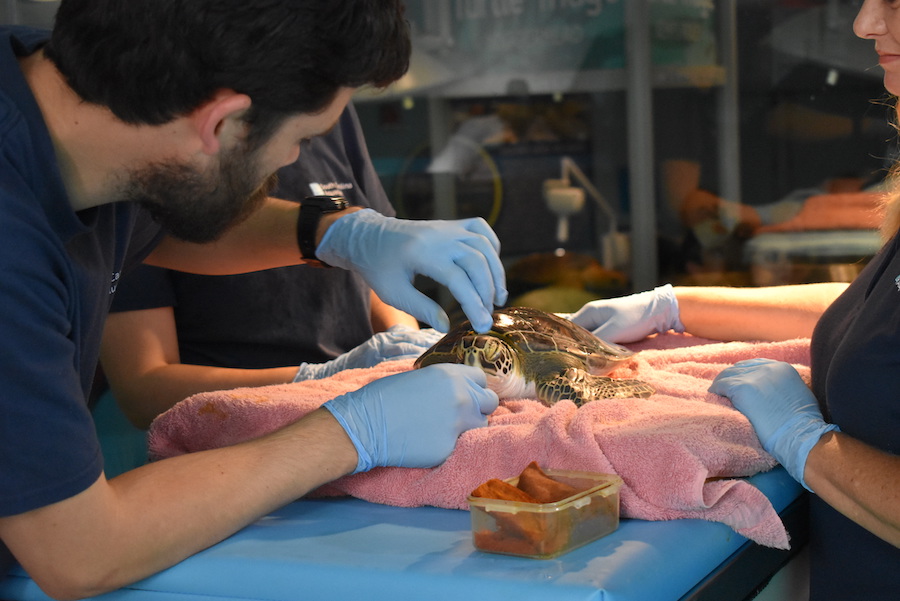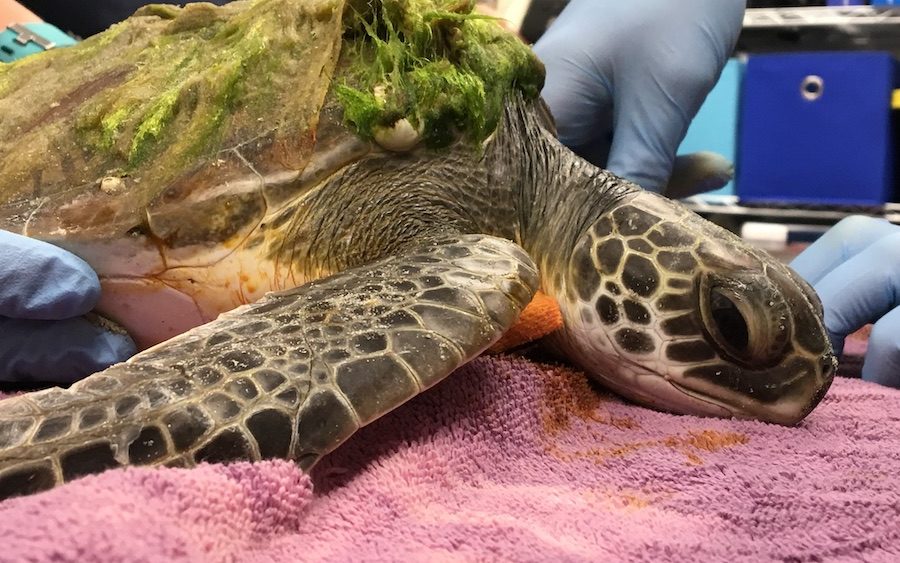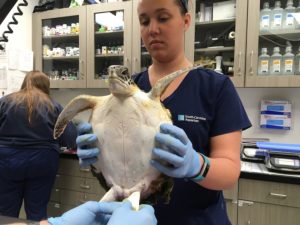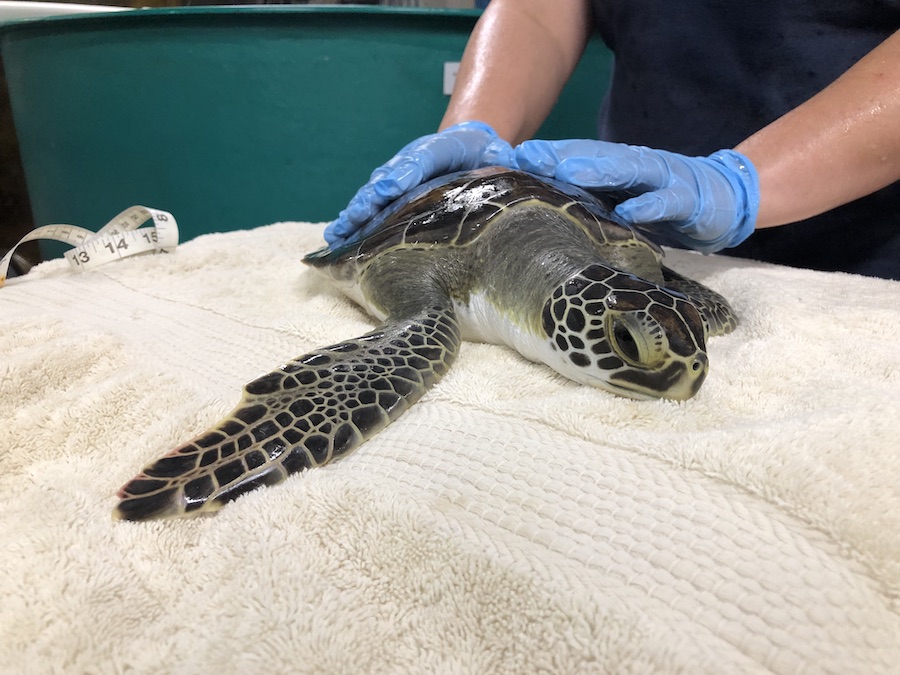Green (Chelonia mydas)
Stranding Location: Sullivan’s Island, SC
Arrival Date: 1/25/19
Age: Juvenile
Weight: 2.1 kg (4.5 lbs)
Case History
Mufasa was found washed up on the sand covered in a thick layer of algae and barely moving. Rescuer Gil called a local turtle expert Madeline McGee whom called the South Carolina Department of Natural Resources (SCDNR). Permit holder and transporter for SCDNR, Mary Pringle, responded to the call. Mufasa was only 51 degrees when Mary arrived. She drove the chilly turtle to the South Carolina Aquarium for treatment.
Treatment
When Mufasa arrived at the South Carolina Aquarium, his internal body temperature was taken. He was only 48 degrees; this categorized him as a cold-stunned sea turtle. We cooled the exam room down as much as possible so we could very slowly warm Mufasa up to a normal body temperature of about 75 degrees. Staff removed the large amount of algae, sand and other epibiota from his shell, revealing a layer of small barnacles all over his carapace. All in all, the epibiota weighed 0.5 kgs (about 1 pound)! Other than being cold-stunned, Mufasa had mild pneumonia that was seen on a CT scan. Pneumonia is common with cold-stunned sea turtles and should heal up with antibiotics. He was given eye drops to treat a small abrasion on his left eye, and fluids vitamins and antibiotics were administered. Mufasa was placed in a bin to rest overnight and warm up.
Updates
January 29, 2019: Since we do not want to warm cold-stunned patients up too quickly, it took two days for Mufasa to reach a temperature close to the water in his tank. He began swimming around right away and was alert, however, he has shown no interest in food yet. Staff and volunteers are monitoring his defecations for any abnormal findings.
February 15, 2019: Mufasa has had a tough few weeks since being admitted to the Sea Turtle Care Center. It took him a couple of weeks to start eating, but he has only defecated once since he arrived. Veterinary staff tube fed a radio dense contrast liquid to see if there are any blockages preventing Mufasa from defecating. At specific intervals of time we can take x-rays to follow the contrast through the GI tract. If there is a blockage, or other issue with the GI, the contrast can give us an idea of what that might be or where it is. Preliminary results showed there seem to be no apparent blockages, but there is a lot of fecal matter and gas in the GI. Mufasa received 2 enemas in hopes this will help him push out the fecal matter in his colon. In addition to all of this, staff found one small piece of marine debris found in his collected fecal sample. Staff will continue to monitor his fecals for more marine debris for the next few weeks.
March 1, 2019: Over the past couple of weeks, Mufasa was receiving warm water enemas and was tube fed mineral oil regularly to help hydrate him and move his gut contents along. The more hydrated we could get him, the easier it would be for his body to digest the gut contents. The enemas also helped to break up any potential impaction or dehydrated fecal matter in his colon. During a few of the enemas, he defecated a little bit but it took almost 2 weeks for any real formed fecal matter to come out on its own. Unfortunately, that first defecation had small pieces of marine debris in it. Whether or not that marine debris was causing any of his issues we do not know, but it seems now that he is defecating more regularly and the fecals are normal! Mufasa was cleared to have a slight increase in his diet and hopefully we can continue to slowly increase the amount of food he gets each day. Mufasa is much brighter, more alert and active these days, and we are happy to see him on the up and up.
March 15, 2019: Mufasa’s treatment has leveled out in the past two weeks. He is beginning to defecate more often but still not reliably. We are not too concerned about this anymore since he is not showing any indication of an impaction, such as lethargy. We will continue to monitor him carefully though!
April 1, 2019: Mufasa has been doing great! He is defecating at least every other day and eating great! Mufasa has started to swim around a lot more. He seems a lot more comfortable since he has started defecating. We’re slowing increasing his diet as he continues to feel better. Way to go, Mufasa!
April 15, 2019: Mufasa was pulled for a weight and measurement this week! Though he’s still a bit on the thin side and will benefit from some weight gain, overall, he’s on the up and up.
 May 4, 2019: Mufasa is cruising through rehab! We are just continuing to give Mufasa more time to gain weight.
May 4, 2019: Mufasa is cruising through rehab! We are just continuing to give Mufasa more time to gain weight.
May 15, 2019: Mufasa is doing wonderfully! He has been eating great for us, and his favorite veggie is dandelion greens! He loves to eat it like spaghetti. As he continues to eat great for us, he continues to gain weight and look better and better.
June 15, 2019: Mufasa was pulled for tagging and a pre-release exam! Mufasa looks great over all, and he received a P.I.T. (passive integrated transponder), similar to a pet microchip. We are waiting on his blood panel to come in. Due to space requirements, we moved Mufasa back down into the ICU into a divided tank with fellow green sea turtles, Zazu and Pumbaa.
June 17, 2019: Mufasa was released today, along with fellow green sea turtle, Zazu. Bon voyage, little guys!
Release Date
June 17, 2019
Release Location
Cape Romain National Wildlife Refuge




